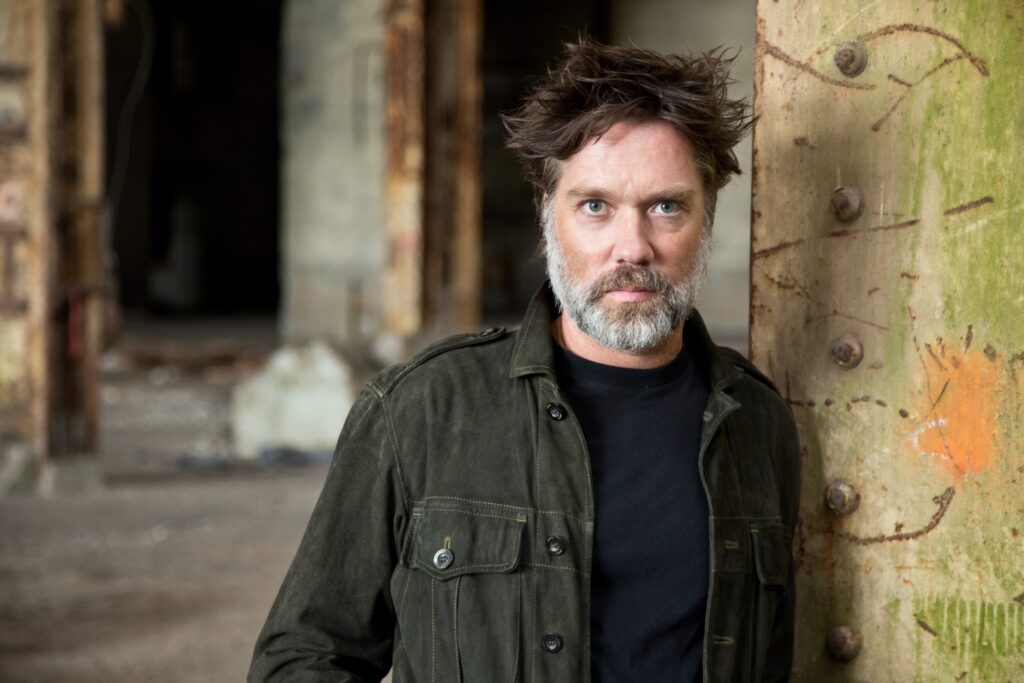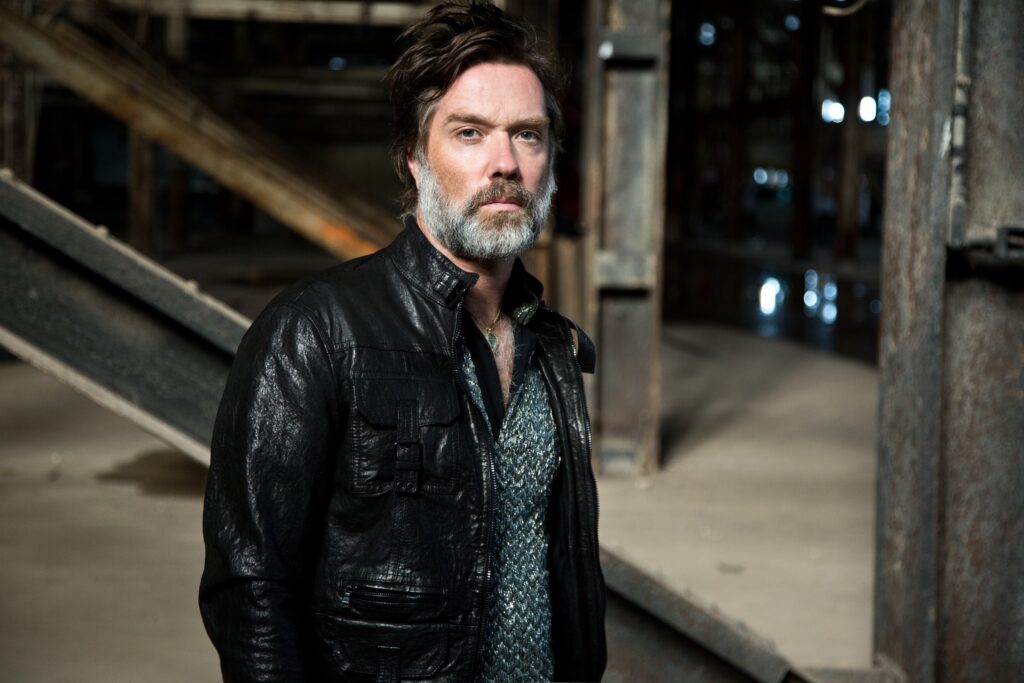Rufus Wainwright is in the mood for Pride
Two-time Grammy Award-nominated singer-songwriter Rufus Wainwright tells us why he’s still passionate about Judy Garland and Pride.
Earlier this year Wainwright shared “Over The Rainbow,” featured on his upcoming Rufus Does Judy at Capitol Studios, his all-new performance of his groundbreaking tribute to Judy Garland, Rufus Does Judy at Carnegie Hall, recorded last year at Los Angeles’ famed Capitol Studios. The new releases is out from BMG on Friday, June 10, and celebrates the iconic Garland’s 100th birthday.
First shared in 2021 via virtual livestream Rufus Does Judy at Capitol Studios, Wainwright used the same microphone Garland herself used while making her own historic recordings at Capitol Studios, backed by a four-piece jazz ensemble before an audience of Renée Zellweger, winner of Best Actress Oscar for her performance as Garland in 2019’s Judy. Wainwright’s duet rendition of “Happy Days Are Here Again/Get Happy” with Broadway star Kristin Chenoweth is another highlight and his rendition of “The Man That Got Away” is a showstopper.
Wainwright will further celebrate Garland’s centenary with a pair of exclusive live residencies, Rufus Does Judy at City Winery, set for City Winery in New York City (June 5, 7, 8, 10) and Chicago (June 16-17). Wainwright performs two shows each night, joined by special guests Laura Benanti (June 5), 2022 Tony Award-nominee Sharon D Clarke (June 7), Mx Justin Vivian Bond (June 8), and Molly Ringwald (June 10).
Wainwright’s first live album, 2007’s Rufus Does Judy at Carnegie Hall was recorded and produced by Phil Ramone over two sold-out nights at Carnegie Hall, backed by a full 36-piece orchestra and special guest appearances from his sister Martha Wainwright, his mother Kate McGarrigle, and Garland’s daughter, Lorna Luft. The album proved an immediate cultural landmark, feted by worldwide media attention and critical acclaim while earning Wainwright his first-ever GRAMMY® Award nomination (for “Best Traditional Pop Vocal Album”). Due to popular demand, Wainwright recreated his momentous tribute to Garland with sold-out, star-studded performances at such renowned venues as Paris’ L’Olympia, Los Angeles’ Hollywood Bowl, and the London Palladium, the latter of which was filmed and released on DVD as Rufus! Rufus! Rufus! Does Judy! Judy! Judy!: Live from the London Palladium.
It comes as Wainwright recently returned to the road with his Unfollow The Rules Tour, performing classic songs, fan favorites, and tracks from his highly praised new album, both solo and backed by his brand-new live combo, Brian Green (John Legend, Michael Bublé) as music director, guitar and backing vocals; Jacob Mann on keyboard, piano and backing vocals; and Alan Hampton on bass, guitar, ukulele and backing vocals.
Q40 caught up with Wainwright to get the lowdown on his love for Judy, fatherhood, and the benefits of getting older.

How is married family life for you as a 48 year-old gay man?
Rufus Wainwright: It’s interesting. I mean, if we look at it within the prism of Judy Garland, let’s say, certainly I think a lot of gay men could have never fathomed the idea of being in their late forties with a child, and being married. So it’s kind of a brave new world in the gay department (laughs) and not what I expected, many years ago when I was roaming the alleyways of Manhattan and London and stuff…so yeah, I’m happy and healthy. And I realize that it’s kind of the little things that make all the difference. So, so, so yeah, we’re over the rainbow (laughs).
I feel that people forty and above, as you say, didn’t expect they could ‘have it all.’ In fact, some of us wondered if we’d survive our youth.
Wainwright: Totally, I mean, I thought, when I hit puberty—and also I was sexually active at the time, I started quite young, it was the late ’80s—for a good 10, 15 years I was pretty sure I was gonna die and and end up alone or marginalized. In some ways this is a very joyous, triumphant story.
You mentioned viewing your life through the ‘Judy prism’, the connection between gay men and Judy Garland is legendary but when did this happen for you?
Wainwright: Well, speaking of being over 40, and I’m already in my late 40s, for me, we are still very much in touch with the whole phenomenon of the family gathering around the television because there were no DVDs or home computers for that matter. So every year The Wizard of Oz would be on TV and everybody would watch it, and it really hit me with that seminal time, at four or five years old, it’s when you’re really created as a human and sentient being. And The Wizard of Oz was part of that process. Later I went on to various other traditional gay Judy branches, you know, whether it was addiction, or camp, or just humor—her sense of humor was so cutting. But now I do feel strongly about her legacy as this kind of gay male icon, it has shifted to being more of a general symbol of survival and also of excellence… So I feel like one of the reasons that I’m doing this series of concerts around Judy Garland’s 100th is to widen her legacy so that it’s not sort of pigeonholed in this tragic gay corner. It’s evolved.
Is there a sense that Garland is too revered to cover in this way? Do you wonder if you’ll have to defend your artistic approach to this tribute?
Wainwright: At the end of the day I approach it as a singer who is singing some of the greatest songs ever written for the human voice. So, whether it’s as a musician or as a composer or someone who is into history, I think it’s fundamentally important to really journey through this material and discover what makes it tick and what makes it great because it can only make you a better singer and songwriter in the end. So I actually feel like it’s very academic and necessary to investigate the material itself.
You have taken this approach before, with Leonard Cohen, and with Shakespeare—not so much covers but rediscoveries of these works.
Wainwright: I try very much to put my own perspective on it. It’s funny, I was [in Australia] many years ago I for one of my various tours and I was with my sister Martha and someone came up the table and said, ‘Oh Martha, you’re such an amazing singer, you’re incredible and I love your work so much. And, you know, your voice is so beautiful. And then she said, ‘Oh, you’re Rufus. You sound like Rufus.’ And I actually took that as a real compliment because at the end of the day, that has been my legacy that I can take any material, be it classical, jazz, pop or anything and really make it my own. I didn’t set out to accomplish that, but nonetheless, that’s what happened. And Judy Garland’s a lot like that, too. You know, she could sing anything and it would be interesting. So I think we have the same goals in a lot of ways, her and I.
What is the connection between art and trauma?
Wainwright: I think we’re trying to, you know, maybe benefit from our trauma in a lot of ways. I’ve always found that my trauma has given me so much inspiration to write songs and compose operas and draw pictures so as long as we can turn our trauma into an engine for good; some people do turn it into an engine for bad. I think you’ve just got to make that decision: Is it going to be an engine for good or bad?
Older LGBTQ folks who struggle with romantic love. Any advice?
Wainwright: What I will say is that I only now understand the whole concept a tiny bit. It was really only in my forties that I started to become comfortable with who I am and what I want and the way the world should be and my imagination. And so I feel like basically until you’re 40 you have no idea. And it’s really only in that sort of second half of life that you start to actually comprehend it properly. Youth is wasted on the young (laughs).
Now your latest non-Judy album, Unfollow the Rules is terrific. Perhaps it got a little bit lost in the shuffle of the pandemic. What was the feeling, the drive behind that album?
Wainwright: For me it was very much a bookend and the sense that, you know, I made my first album in L.A. over 20 years ago and it was in a big old Hollywood studio with with fabulous session players and so forth. So I very much wanted to mirror that experience again now that I’m back in California. And so I went to some of the same studios, used some of the same musicians, with a fraction of the budget, but in a weird way, I think that gave some sense of clarity because back in the in the olden days, I could just sort of lounge about and throw spaghetti at the wall. Now you’ve got to eat what you’ve thrown (laughs).
You are our June Pride Cover. What does Pride mean to you after so many years?
Wainwright: I think Pride has gotten better over the years, frankly. I mean, maybe it was amazing when it first began, which was before my time, but when I first sort of came into my own as a gay man, I always felt Pride had become very commercial and just sort of this surface thing. But I really felt like after Black Lives Matter and then also with all these rights under threat by the Supreme Court, and stuff going on in Russia with gay rights, there seems to be more of a sense of social activism that has been re-injected into Pride. Parties are fantastic and I don’t want to take all the fun out but I think there has to be more of a socially conscious aspect because we can lose this all in a heartbeat.
Rufus Wainwright Tour Dates
For complete details and remaining ticket availability, please visit rufuswainwright.com/tour.
JUNE
5 – New York, NY – City Winery (Two Shows) *
7 – New York, NY – City Winery
8 – New York, NY – City Winery
10 – New York, NY – City Winery (Two Shows) *
14 – Los Angeles, CA – The Ford
16 – Chicago, IL – City Winery (Two Shows) *
17 – Chicago, IL – City Winery (Two Shows) *
23 – Worthing, UK – Worthing Assembly Halls
25 – Bath, UK – Bath Forum
26 – Rhyl, UK – Rhyl Pavilion Theatre
30 – Zaragoza, ES – Parque Grande José Antonio Labordeta
JULY
2 – Vigo, ES – Vigo Foundation Theater
6 – Dublin, IR – National Concert Hall
7 – Kassel, DE – Kulturzelt
11 – Amstelveen, NL – Amsterdamse Bostheater (SOLD OUT)
19 – Frankfurt, DE – Palmengarten
27 – Madrid, ES – Teatro Real †
30 – Glasgow, UK – Kelvingrove Bandstand
SEPTEMBER
14 – Dallas, TX – Majestic Theatre
15 – Austin, TX – The Paramount Theatre
17 – Houston, TX – The Heights Theater
OCTOBER
9 – Hammondsport, NY – Concerts at Point of the Bluff Vineyards
11 – Annapolis, MD – Rams Head On Stage
12 – Alexandria, VA – The Birchmere
NOVEMBER
12 – Kansas City, MO – Kauffmann Center For The Performing Arts
Visit Rufus Wainwright here.






